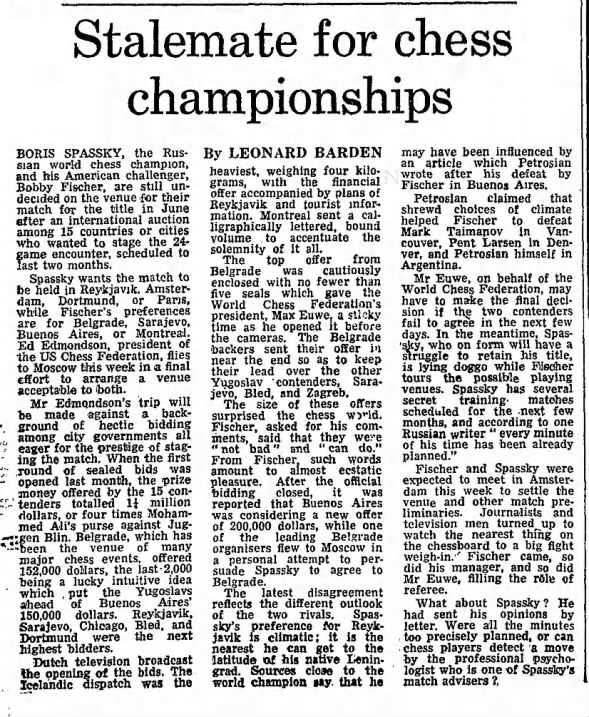The Guardian London, Greater London, England Friday, February 04, 1972 - Page 5
Stalemate For Chess Championships by Leonard Barden
Boris Spassky, the Russian world chess champion, and his American challenger, Bobby Fischer, are still undecided on the venue for their match for the title in June after an international auction among 15 countries or cities who wanted to stage the 24-game encounter, scheduled to last two months.
Spassky wants the match to be held in Reykjavik, Amsterdam, Dortmund, or Paris, while Fischer's preferences are for Belgrade, Sarajevo, Buenos Aires, or Montreal. Ed Edmondson, president of the U.S. Chess Federation, flies to Moscow this week in a final effort to arrange a venue acceptable to both.
Mr. Edmondson's trip will be made against a background of hectic bidding among city governments all eager for the prestige of staging the match. When the first round of sealed bids was opened last month, the prize money offered by the 15 contenders totalled 1¼ million dollars, or four times Muhammad Ali's purse against Juggen Blin. Belgrade, which has been the venue of many major chess events, offered 152,000 dollars, the last 2,000 being a lucky intuitive idea which put the Yugoslavs ahead of Buenos Aires; 150,000 dollars. Reykjavik, Sarajevo, Chicago, Bled and Dortmund were the next highest bidders.
Dutch television broadcast the opening of the bids. The Icelandic dispatch was the heaviest, weighing four kilograms, with the financial offer accompanied by plans of Reykjavik and tourist information. Montreal sent a calligraphically lettered, bound volume to accentuate the solemnity of it all.
The top offer from Belgrade was cautiously enclosed with no fewer than five seals which gave the World Chess Federation's president, Max Euwe, a sticky time as he opened it before the cameras. The Belgrade backers sent their offer in near the end so as to keep their lead over the other Yugoslav contenders, Sarajevo, Bled and Zagreb.
The size of these offers surprised the chess world. Fischer, asked for his comments, said that they were “not bad” and “can do.” From Fischer, such words amount to almost ecstatic pleasure. After the official bidding closed, it was reported that Buenos Aires was considering a new offer of 200,000 dollars, while one of the leading Belgrade organizers flew to Moscow in a personal attempt to persuade Spassky to agree to Belgrade.
The latest disagreement reflects the different outlook of the two rivals. Spassky's preference for Reykjavik is climatic; it is the nearest he can get to the latitude of his native Leningrad. Sources close to the world champion say that he may have been influenced by an article which Petrosian wrote after his defeat by Fischer in Buenos Aires.
Petrosian claimed that shrewd choices of climate helped Fischer to defeat Mark Taimanov in Vancouver, Bent Larsen in Denver, and Petrosian himself in Argentina.
Mr. Euwe, on behalf of the World Chess Federation may have to make the final decision if the two contenders fail to agree in the next few days. In the meantime, Spassky, who on form will have a struggle to retain his title, is laying doggo while Fischer tours the possible playing venues. Spassky has several secret training matches scheduled for the next few months, and according to one Russian writer “every minute of his time has been already planned.”
Fischer and Spassky were expected to meet in Amsterdam this week to settle the venue and other match preliminaries. Journalists and television men turned up to watch the nearest thing on the chessboard to a big fight weigh-in. Fischer came, so did his manager, and so did Mr. Euwe, filling the role of referee.
What about Spassky? He had sent his opinions by letter. Were all the minutes too precisely planned, or can chess players detect a move by the professional psychologist who is one of Spassky's match advisers?
 Stalemate For Chess Championships Fri, Feb 4, 1972 – 5 · The Guardian (London, Greater London, England) · Newspapers.com
Stalemate For Chess Championships Fri, Feb 4, 1972 – 5 · The Guardian (London, Greater London, England) · Newspapers.com























